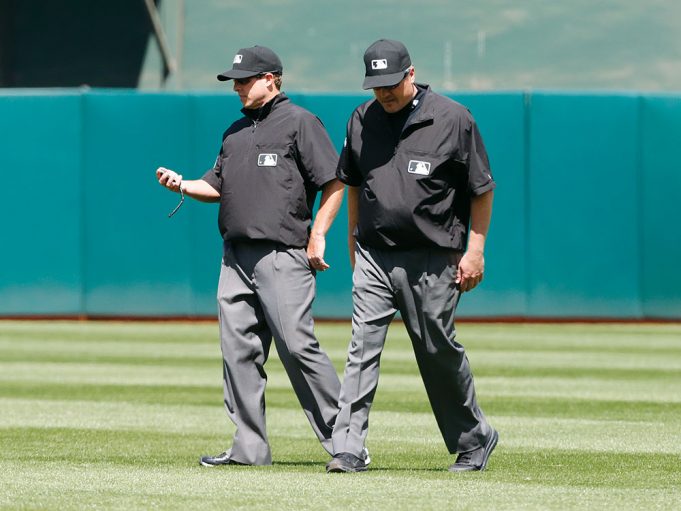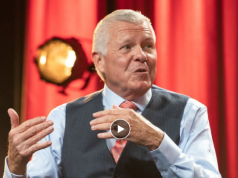More and more, we seem to lose sight of the fact kids might be playing three sports just for the fun of it. Now, it’s, “What’s the one thing that will give you the most success and potentially offer the best payback?”
Is the same mindset permeating officiating? A national survey found that about 38 percent of officials work more than one sport, and these people have a host of reasons why they do. These range from the need for more money to the simple wish to contribute more to what they love, the world of sport. Somewhere in there is a subgroup that hopes working a variety of sports will help them find one where they can climb to a high level and win spoils that go with it. Whatever the motivation, it’s a fair question to ask whether working multiple sports is a growth experience or a blueprint for mediocrity.
Mediocrity? A world-class heptathlete can run, throw and jump better in toto than most women. In the interest of full disclosure, however, she’d also finish up the track against the best sprinters, lose to the best jumpers and envy the best throwers in an Olympic final. Is it, then, a copout for her to crow about being “the best second-best at everything”? Does she not deserve a Mercedes, too, as a prize for all her (not quite good enough) hard work? Many people get more satisfaction from doing a lot of things well than being a conqueror at only one. The same goes for officials working multiple sports. The problem is whether the skills needed to work one sport well become poor fits, or even obstacles, when trying to take up others.
In my own case, I’ve worked five different sports at the high school level or above, but never more than three at once. We all have acquaintances who do even more than that. For me, the thought of hitting the big time in one sport may have been a motivation early on. As I started a family and developed more responsibilities at work, though, I realized I had neither the level of determination nor the raw ability to make it happen. From my perspective, I had a life, no matter how much fun officiating might be. So, I came to grips with working a few sports I really liked and cultivated the changing scenery from season to season. It’s always been important to me that I could work a game, go home at a decent hour, fall into my own bed and forget about it; no one owned me. I also learned that, like a decathlete, I wasn’t a natural at some sports but had the wiring to become proficient at them all with practice and a focus on improvement. That included learning something from one sport that I could apply to making me better at another — something which might be easier said than done.
Some skills transfer better from one sport to another
In the pharmaceutical world, there’s a term called cross-contamination. It can occur when the right ingredients wind up in the wrong product, causing an unwanted effect. It’s not that a blood-thinning agent is bad for you, but it’s a big problem if it sneaks into your meds for a bleeding ulcer. By analogy, we could imagine the problems a great basketball official might have if trying to apply those exact same instincts and skills to football: The quick, unflinching decision he needs on a drive to the hoop might be “too quick” when deciding if a hold affected the play and merits a flag. For balance, some habits transplant well between sports: Basketball officials might transition to volleyball better than others because both sports call for that quick incident recognition and whistle; in the same scenario, a rugby official might come across as uncertain and indecisive because he’s been programmed to think twice and whistle once to get the job done.
None of this suggests you’re doomed to discomfort and discontent if you try working more than one sport; you just have to realize that one size does not fit all as you migrate between sports. The key to succeeding as a multi-sport official is adaptability and it applies to all facets of the avocation: judgment, presentation, game management and conditioning. That’s because a big part of credibility is your acceptance by the people you serve. If you don’t portray the image people expect, you immediately attract scrutiny and maybe even suspicion. Coaches and players want to be the trendsetters, so they become Sheldon Coopers when it comes to us: they want everything to stay the way they’re used to. Be ready to adjust your approach to fit the image. Let’s look at these performance elements and see how we can evolve within them.
Judgment is the most obvious evidence of your knack for calling a game. Take baseball or softball, for example. A lot depends on how well you can picture a virtual, pentagonal prism. Then you decide, within a half-inch or so, if a rapidly moving sphere has intersected it. To do this consistently, the spatial part of your forebrain must be up to the job. Calling pass interference in football is a different challenge. First, you move to the best position to observe the play as it happens; that’s the easy part. Then you weigh the often-conflicting facts of what you saw against the applicable rule; that’s harder. Finally, you decide the legality of the play and do this all in about one breath. That’s the cognitive side of your brain at work, with a little help from your memory of the hundreds of similar plays you’ve witnessed before.
Each sport calls upon a different combination of spatial and cognitive thinking and every brain has a different capacity for each: Few of us can draw a flower with our left hand while solving calculus with our right, so we must learn to make best use of what we’ve been given. In practical terms, it means we’re more likely to succeed at sports where our own wiring is suited to the decisions we’re required to make. I’m known as a person who describes my world in words, but wears a green and a blue sock to work. Meanwhile, my wife sees the world in pictures, making for fascinating debates over gardening and the bank book. Not surprisingly, I’ve done better at sports requiring some quick reasoning, like football, soccer and basketball. By comparison, I was never great at baseball because my strike zone wasn’t consistent. If you’re struggling in a sport, consider switching to one that’s more like one you’re enjoying.
Presentation is the advertising arm of officiating. An NHL supervisor once told me the players commonly form their perception of the officials by their skating ability. The more a referee or linesman looks like he could play the game, the bigger the break they get while cutting their teeth in the league. Players associate skating skill with knowledge of the game and thereby with credibility of calls. On another note, it’s always interesting to look at newsreel coverage of games from decades ago. In many cases, the mechanics were laughable, the positioning haphazard and the uniforms ill-fitting. These details have been improved and standardized as a function of scrutiny to the point where presentation is now a qualifier, not a differentiator, for an official. This means that while you might get away with calling holding a little more loosely or being firmer on handballs, you won’t get far by being a visual maverick. If you have your own way of signaling a foul or determining the length of your trousers, get over yourself and get in line. If you find yourself suffering through harsher criticism than your colleagues in a sport, look at how you come across. If you won’t blend in or, in some cases, can’t blend in, the sport may not be for you; find a better fit.
Game management skill separates the wheat from the chaff. There was a time an official would walk into any venue and what he or she decided, went — end of story. Players didn’t have to like you but they were well advised to learn to live with you. A lot of that was because officials were more expendable; if they didn’t look after themselves, nobody else would, either, so they had to be more forceful. Today, most sports understand both the importance of officials in presenting the product and the investment required to shape them to that aim. Leagues regiment officials more, as a result, implying an endorsement of them. It makes the leagues more sensitive to complaints about officials. That means officials are expected to endure what the league tells them to from the participants; it sure helps if they can handle that.
If you don’t like hearing a lot of bad words, don’t work college football. If you think your actions require no explanation, avoid refereeing rugby. To succeed at more than one sport, your character should be amenable to each one. Personally, I don’t think that kind of emotional flexibility is a character trait you can turn on and off in the locker room; you come to the game with it as a product of your life experiences. Hall of Fame umpire Doug Harvey worked his first major league game at Dodger Stadium. When asked what he thought of the place beforehand, he estimated it wou22ld have taken him six-and-a-half hours to plow, back home. Harvey had a reputation for never losing his temper on the field.
Expand skills from your comfort zone to other sports
The first sport officials take up is often the one they enjoyed most when they were playing. As a result, it probably suits their mental makeup well and they learn their basic game management skills in a “familiar” environment. From there, they learn how to apply those skills farther from their comfort zones as they grow into other sports. It follows that the more sports you work, the more you’ve found out about yourself to help you flourish. Conversely, if you find yourself suffering through games and dreading assignments, you may have found your limit; stop torturing yourself and step back. It’s OK.
Every sport requires a different kind of conditioning — some of it physical and some mental. Without question, soccer requires superior conditioning at the highest levels and, perhaps not surprisingly, soccer officials have one of the lowest median ages. It’s also been said volleyball officials could come from a tournament with clean, dry uniforms but need someone to help brush their teeth. The level of sustained, mental focus required transcends most other sports. Fortunately, preparing the legs often helps prepare the brain for sustained activity, so if you maintain your physical fitness, virtually any sport should be easier to work.
Where some officials struggle is in knowing when to quit. At the tail end of your career, your body’s suitability to the task can fade both unpredictably and quickly. Prior to that, you’ll go through a phase where your recovery time after a game becomes much greater, regardless of fitness level. The solution for many people is to work fewer games or to use more ice, but a better bet might be to switch to a sport that’s less demanding. Sports like swimming and wrestling require an athletic appearance that a conditioning program benefits, but don’t tax the body as much. Don’t quit football entirely because the Friday night varsity games are too soon after the Tuesday middle school games; take what you’ve learned about player control, judgment and professional behavior from your primary sport and substitute some of it into a less demanding one. The new perspective you gain may even help you in both sports.
I knew of a fellow, years ago, who figured out that he could make more money refereeing every day than working a nine-to-five job. He lived in a metro area where he could call a game virtually every day of the week — so he did! He worked something like 300 days out of the year — and it showed. He wasn’t sharp, never quite clean, always a step behind the play … and tolerated more than coveted by his employers.
Multi-sport officiating is a sickness if you don’t find a way of keeping it within your grasp.
What's Your Call? Leave a Comment:
Note: This article is archival in nature. Rules, interpretations, mechanics, philosophies and other information may or may not be correct for the current year.
This article is the copyright of ©Referee Enterprises, Inc., and may not be republished in whole or in part online, in print or in any capacity without expressed written permission from Referee. The article is made available for educational use by individuals.


















